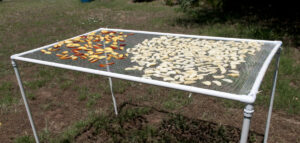Every year about this time, my wife and I plan what we are going to plant in our summer garden. Now one of the things that we take into consideration is how easy it is to preserve any extra food that we grow. Dehydrating vegetables is one of our favorite methods. It is easy to do and doesn’t take a lot of effort. We always plan to dehydrate vegetables and properly packaged it can last for years in our storage. So we plant extras of the vegetables that are easy to dehydrate.
The following list shows the best-dehydrated vegetables.
Probably the easiest to dehydrate are
- Onions
- Peppers, hot/chili.
These vegetables all dehydrate well
- Artichokes
- Asparagus
- Beans, both green and wax
- Beans, lima
- Broccoli
- Beets
- Cabbage
- Carrots
- Corn
- Eggplant
- Kohlrabi
- Mushrooms
- Okra
- Parsnips
- Peas
- Peas, black eyed
- Peppers, green or red
- Potatoes
- Pumpkin
- Rutabagas
- Squash, summer
- Sweet potatoes
- Tomatoes
- Turnips
- Zucchini
Now the following list of vegetables can be dehydrated, but they don’t rehydrate well. But they are good when you crumble them up and use them dried for seasoning. The leafy ones in particular become soggy and limp when rehydrated.
- Brussels sprouts
- Cauliflower
- Celery
- Cucumber
- Greens, this includes collard, mustard, greens , watercress, turnips greens, wild mustard and other similar plants.
- Kale
- Lettuce
- Radishes
- Spinach
- Squash, winter
- Swiss chard

If you are going to start to dehydrate vegetables, I recommend that you get a good quality dehydrator. The one we use is a Excalibur. After using it many times since then I still have nothing but good to say about it.
If you can’t afford a dehydrator, make a drying rack and use the sun. It is a good idea to have one anyway for backup if the power fails. An Easy to Make Drying Rack.
If you haven’t already, start dehydrating fruit and vegetables this summer you will be glad you did.
Howard



I though dehydrated food only lasted for one year. Are you saying the ones you listed will last for longer than a year? If so how long? I have been thinking about a freeze dryer since food done this way will last 20 to 30 years and the process time goes from three or four days to one. I know the expense is higher on the front end but for how long it will store plus the time involved in dehydrating I’m tinking it might be worth it. I don’t really know.
Properly packaged dehydrated foods will last for many years. For example the apples from the LDS will last for 20 years. I have dehydrated foods in my storage that are al least several years old and they are fine and they are just in mason jars with an o2 absorber.
Howard
Is there a list that might show how long things will last if properly stored?
I wanted to wait until we could afford an excalibur; but my son bought me one from a local store. It didn’t come with a front panel, so I am sure it wastes electricity; but I didn’t want to return it and hurt his feelings.
Ah well.
Thank you so much for this list. Much appreciated!
The Ultimate Dehydrator Book can be purchased from Amazon. It is a superior book on dehydrating all sorts of food. It is the one I use. The most common timetable give is that dehydrated food will typically last 10-15 times longer than food in your freezer will still be palatable. So given that 6 months to a year is a reliable standard for frozen food (but often longer) you can say that dehydrated food will last (if properly packaged) for anywhere between 6-10 years. Of course, you can always dehydrate more every few months and just use your dated packages while replenishing your supply so there is no waste whatsoever.
Greetings from Greece. I am new at dehydrating, I own a dehydrator, but I also dehydrate under the sun, thanks to our warm summers. I ‘d like to ask this question: the cost of mason jars and oxygen absorbers is forbidden for me, so, if I just put dehydrated vegetables in ordinary jars without oxygen absorbers, will they last for long term? Also, is it true that rice inside jars absorbs moisture? Thanks in advance and also thank you about your informative site.
Yes, re-used pickle & jelly jars work great; leave them in the summer sun for a day to remove any unwanted aromas. Rice makes a great, natural desiccant if you are ‘jarring’ dehydrated food that can easily be separated from the grains of rice. You can also save used dessicants and re-charge them by dehydration so they can be reused.
If you use these jars for storing ferments, it’s a good idea to cover the jar with plastic wrap (Saran Wrap,) then twist on the lid… the acid created by fermentation tends to eat away at the metal lid and the plastic wrap prevents this.